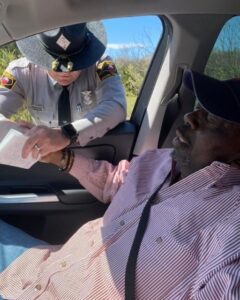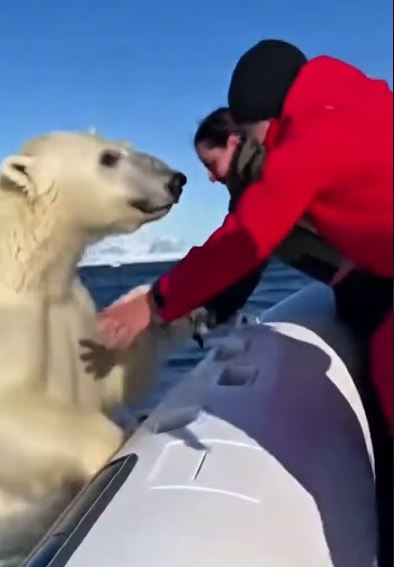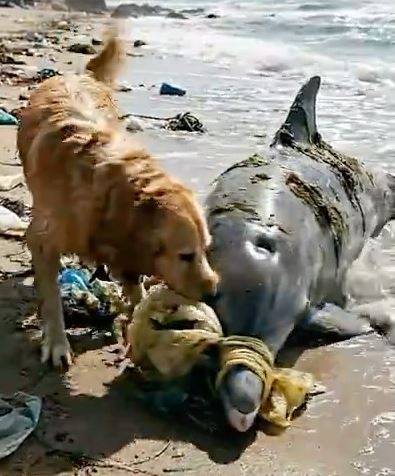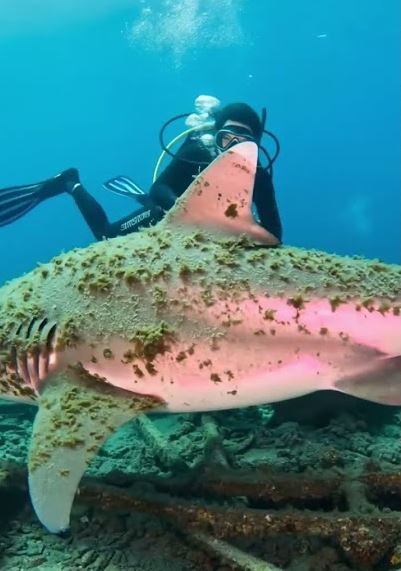I swear I was only pulling off the highway for a minute—he said he was just feeling lightheaded. “Probably nothing,” Cyrus mumbled. That’s how he always was—downplaying everything. Even when he had that kidney scare last fall, he kept calling it “a cramp.”
But this time… this time felt different.
We were headed to his cousin’s memorial, nearly four hours away. I offered to drive, but of course, Cyrus insisted. Said he knew the backroads better than GPS ever could. And then—just twenty minutes out—he said he needed a break and pulled over. That was thirty minutes ago.
I had stepped into the trees to take a quick call from my daughter. When I came back, he was still in the driver’s seat, eyes closed, head tilted slightly like he’d just dozed off.
Except…
His chest wasn’t rising.
That’s when the patrol car pulled in behind us. I flagged the officer down before I could even process what was happening.
He approached calmly at first. You could tell he thought it was a routine stop. Until he leaned in.
“Sir?” the officer said, tapping the window. No response.
I watched his expression shift from mild concern to sharp focus. He opened the door and leaned across Cyrus, checking for a pulse. Still nothing. Then he gently shook Cyrus’s hand and raised his voice.
“Sir, can you hear me?”
I wanted to scream, but no sound came out.
The officer looked at me, eyes narrowed. “When’s the last time he spoke to you?”
And I—I didn’t know. Maybe fifteen minutes ago? Maybe longer? Time had blurred.
He pulled out his radio, voice tight and urgent. He called for medical assistance.
Then Cyrus made a sound.
A low, almost imperceptible groan.
The officer froze, his eyes locked on Cyrus.
“Say that again,” he said. “Come on, buddy, talk to me.”
Cyrus’s mouth parted.
A ragged breath escaped. I lunged forward, grabbing his shoulder. “Cyrus? Hey! Hey, stay with us!”
His eyes fluttered open—barely. They didn’t seem to focus. The officer knelt beside him, tilting his head gently to open his airway. “He’s in shock. Might be cardiac,” he said.
The ambulance arrived within ten minutes, though it felt like an hour. They moved with practiced urgency, sliding Cyrus onto a stretcher, connecting machines, and lifting him into the ambulance. I wasn’t allowed to ride along—liability, they said—so I followed in our car, hands clenched around the steering wheel.
At the hospital, the waiting was unbearable. I filled out paperwork, called his sister, and paced holes into the floor. After what felt like forever, a doctor came out—tired, but kind.
“He had a transient arrhythmia. His heart paused, briefly—but not long enough to cause lasting damage. He’s very lucky someone was with him when it happened.”
I exhaled so hard I nearly collapsed into the chair behind me. “He’s okay?”
“He’s stable. We’re keeping him overnight for observation. But yes—he’s okay.”
I whispered “thank you” over and over. A nurse let me see him for a few minutes. He was pale, wires running from under the blanket, but his eyes opened when I said his name.
“Sorry I scared you,” he mumbled.
“You idiot,” I said, laughing through tears. “You scared the hell out of me.”
We got home two days later. Cyrus moved slower than usual but still insisted on making breakfast the next morning—like nothing had happened. Finally, I had to sit him down.
“You need to stop pretending you’re invincible.”
He looked sheepish. “I didn’t want to ruin the trip. We were already late.”
“Ruin the trip? Cyrus, you flatlined. That officer may have saved your life.”
He nodded, more serious. “I know. I just… I don’t know how to ask for help. It doesn’t come naturally.”
I reached across the table and took his hand. “Start trying.”
Something shifted after that. He started taking his medications on time. Kept every follow-up appointment. Even started therapy—something he’d avoided for years. And me? I stopped waiting for a crisis to speak up. We both did.
But the real turning point came a few months later. We drove back to that stretch of highway. Cyrus insisted.
“I want to see it. Where it happened,” he said.
We pulled over at almost the exact mile marker. There wasn’t much—just pine trees and cracked pavement—but Cyrus got out, stood by the edge of the woods, and breathed. Deeply. Intentionally.
“You know,” he said, “I don’t remember any of it. Not your face, not the officer. Nothing. Just darkness. Then… your voice.”
I looked at him. “Really?”
“Yeah. It was faint, but clear. You were calling me back. That’s what it felt like.”
We stood there a while longer, not speaking, just letting the moment settle. Then Cyrus pulled something from his pocket—a small metal tag, like a military dog tag. He’d had it made the week before.
He handed it to me.
On the front, it read: **“If I go quiet, don’t.”**
And on the back: **“Thank you for calling me back.”**
I laughed, then cried, holding it like it was something sacred. Maybe it was.
Today, Cyrus volunteers at the local firehouse on weekends—mostly running drills and helping with first aid classes. He says it’s not about being a hero. It’s about never being unprepared again. We even got certified in CPR together.
That officer? We found him. I wrote a letter—a real one, with pen and paper and far too many emotional run-on sentences. He wrote back with the kind of humility only true professionals have. Said he was just doing his job.
But he did more than that.
He gave us more time. More dinners. More road trips. More second chances to laugh at old inside jokes. And more quiet moments like this one—where I get to tell our story not as an ending, but as a beginning.
So if someone in your life keeps saying they’re “fine,” even when they’re not—pay attention. Ask again. Pull over. Be insistent. Don’t be afraid to make a scene.
Because one quiet moment can change everything.
And if you’ve ever called someone back from silence—thank you.
You may have saved a life.




